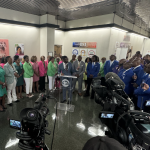
This is an opinion column.
In Alabama, justice isn’t blind. It’s forward looking. Forward to the next election.
Judges – despite the robes and the gavels and the desperate air of infallibility – are not always paragons of virtue.
Or even good sense.
We’ve seen racist and sexist judges, bold and dumb enough to share stripper videos with staffers who did not want to see it. We’ve seen judges accused of misusing money and lying about it. We’ve seen a judge accused of taking inmates out of cells and spanking their bare bottoms. We’ve seen one sentenced for stealing from an elderly veteran.
And more often we’ve seen judges be politicians first. The worst of them have one eye on the evidence and the other on the polls.
Which means – if you look at how politics is conducted in this state – they will on occasion forgo wisdom, courage and common sense for political street cred.
And people have died because of it.
And people will continue to die because of it.
The Alabama Legislature had another chance this year to fix that, another opportunity to address a serious hole in the state’s claim that it values life and justice and the jury system. But politicians again did what politicians do. They chose politics instead.
Alabama for many years was uniquely unjust, allowing elected judges to simply disregard the will of juries in capital cases. If jurors listened to evidence and found a defendant guilty, but also found reason to recommend life in prison instead of death, the judge was free to ignore the jury. No other states with elected judges allowed that.
The judges could override the jury on a whim, or meanness, or fear of the next election, and send the defendant to death, sometimes without the jury’s knowledge.
It happened to almost 100 people. The Legislature in 2017 banned judicial override, putting that control back in the hands of juries. But it did not make it retroactive, so about a third of those sentenced to death by judges, over the recommendation of juries, still remain on death row.
As former U.S. Supreme Court Justice John Paul Stevens once put it, the overrides don’t just countermand the judgment of the juries and the community, “they express contempt for that judgment.”
And they do. When Judge Pride Tompkins decided to ignore the jury’s recommendation not to kill a man, he said he did it because he thought the jury was swayed by the emotional words of the man’s mother.
Some judges, like Mobile County Judge Ferrill McRae, overrode juries time after time after time.
It is easy to see the danger. It’s easy to find racial disparities, to see judges who campaign on being tough on crime and use judicial override to prove that point. It’s easy to smell the disdain for juries, to feel the inherent hypocrisy in a state that officially claims to value life but executes more people per capita than any other state, according to the Equal Justice Initiative.
It is just hard to fathom why Alabama politicians lack the guts to change it.
Except for cowardice. And fear. Except for a willingness to forsake the notion of “justice for all” for the veneer of looking tough on crime.
The Alabama House Judiciary Committee this week killed a bill that would have required courts to resentence the people – the committee estimated about 33 of them – who are awaiting death in Alabama prisons because judges ignored the will and the wishes and the wisdom of juries – if we are to still believe juries underpin our entire system of justice.
The politicians voted along party lines. They voted the bill down to honor crime victims, they said. They voted it down, as Rep. Jim Hill, a former circuit judge from Moody put it, rather than second guess the judges.
It says a lot about what they think of jurors. And what they do not.
Which says a lot about how they look at justice.











